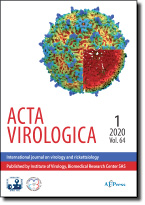Journal info
|
||
Select Journal
Journals
Bratislava Medical Journal Endocrine Regulations General Physiology and Biophysics Neoplasma Acta Virologica Current articles 2023 2022 2021 2020 2019 2018 2017 2016 2015 2014 2013 2012 2011 2010 2009 2008 2007 2006 2005 2004 2003 Studia Psychologica Cardiology Letters Psychológia a patopsych. dieťaťa Kovove Materialy-Metallic Materials Slovenská hudbaWebshop Cart
Your Cart is currently empty.
Info: Your browser does not accept cookies. To put products into your cart and purchase them you need to enable cookies.
Acta Virologica Vol.62, No.1, p.78-85, 2018 |
||
| Title: Wogonin, a flavonoid isolated from Scutellaria baicalensis, has anti-viral activities against influenza infection via modulation of AMPK pathways | ||
| Author: R.-K. SEONG, J.-A. KIM, O. S. SHIN | ||
| Abstract: Wogonin, a flavonoid isolated from Scutellaria baicalensis, has attracted increasing scientific attention in recent years because of its potent anti-tumor activity. Its role during viral infection has largely been unexplored. Wogonin treatment effectively suppressed both influenza A and B virus replication in Madin-Darby Canine Kidney (MDCK) cells and human lung epithelial (A549) cells. In contrast, wogonin treatment following influenza A virus infection led to up-regulation of interferon (IFN)-induced antiviral signaling. Additionally, influenza A virus infection in A549 cells induced 5' adenosine monophosphate-activated protein kinase (AMPK) phosphorylation and activation in a time-dependent manner and wogonin treatment led to the suppression of AMPK phosphorylation. Furthermore, the treatment with AMPK-specific inhibitor (compound C; CC) attenuated influenza A virus replication. These data suggest that wogonin possesses a potent anti-influenza activity mediated by regulation of AMPK activation, suggesting that wogonin has the potential to be developed as an anti-influenza drug. |
||
| Keywords: wogonin; influenza; interferon; AMPK; anti-viral signaling | ||
| Published online: 09-Mar-2018 | ||
| Year: 2018, Volume: 62, Issue: 1 | Page From: 78, Page To: 85 | |
| doi:10.4149/av_2018_109 |
||
|
|
 download file download file |
|

